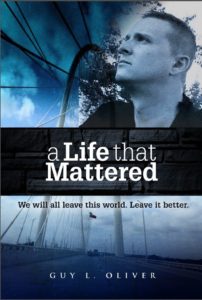 It’s a hell of a thing, turning your back on your child. At some point you just stop lying to yourself and you think “He is going to end up in jail or dead”, and you hate yourself for the thought. Some part of you still clings to the optimism of his youth when he was still young and impressionable and you think “He’ll return. He’ll come back to his senses. He’ll see the folly of these life choices.” You fantasize about the day he’ll be himself again, free of the bad influences and the terrible choices, and then you finally turn within yourself and retort “No.”
It’s a hell of a thing, turning your back on your child. At some point you just stop lying to yourself and you think “He is going to end up in jail or dead”, and you hate yourself for the thought. Some part of you still clings to the optimism of his youth when he was still young and impressionable and you think “He’ll return. He’ll come back to his senses. He’ll see the folly of these life choices.” You fantasize about the day he’ll be himself again, free of the bad influences and the terrible choices, and then you finally turn within yourself and retort “No.”
Reluctantly, you accept the fact that your child is imprisoned in a hell you don’t understand, can’t imagine, and of which there is no breach point; you can effect no rescue. You finally understand that he is in a prison of his own making and that only he can fashion his escape.
For the parent of an addict, the optimism typically fades and you finally accept his reality, as I did.
That moment came for me the evening Tim came to visit and assist Rachel with her move. After the attending officer left, I drove him and Jennifer to the bus station, purchased two one-way tickets to Fort Worth for them, and returned home.
I was standing in the kitchen thinking about how I had turned my son and his girlfriend out—left them at the bus station while I was in the safety and comfort of my home. I hated that moment as much as I hated myself in it and I found myself wanting to go back.
I wanted with every fiber of my being to go back into the night and retrieve the two of them, bring them home and say “I’m sorry” and “I love you” and “Don’t disappoint me again.” And then my phone rang.
It was Tim, and as I answered the call I thought “Tell him all is forgiven. Tell him you love him. Tell him that you’re on your way to pick him up and bring him home. Tell him that you didn’t mean it, that you lost your head and made a snap decision, that your anger got the best of you.”
What came out of my mouth, instead, was a simple “Hello.” at which time I was subjected to my son’s escalating anger. I stood in my kitchen looking at Heidi as I listened to the rage his sense of entitlement spawned.
I listened and remained quiet, biting my tongue, my own anger rising. With each curse he uttered, I turned away and then turned a little more, until I finally stopped listening. God help me, I had reached my limit and there was no going back. I looked at Heidi as she returned my gaze and in that moment embraced the truth. My son simply wasn’t mine any longer.
He had become someone, some thing I simply didn’t recognize and no reconciliation was possible. When he was finished, I allowed a pause, and then simply said “Goodbye, son.”
Goodbye. It was not a goodbye that merely signaled the end of a conversation with a loved one. It was not a goodbye that signified the end of our visit together. It was the worst goodbye of all. It was the goodbye you tell someone when you can no longer afford to be in his life any longer.
It was not the only time I have said such goodbyes, and they are a strange lot. When you say this particular goodbye it is typically without feeling, which is how you know it is overdue and how it is identified. This goodbye is said with modest remorse and a knowing that alternatives no longer avail themselves. With that goodbye we were estranged and we stopped speaking to one another.
And so it was for several years, until I received the first of two fateful calls from Tim’s mother regarding him.
“Guy, it’s Dawn.”
“Hi.”
“I have bad news.”
“What happened?” I slowly asked, intuitively knowing it was news regarding Tim and not wanting to hear the news I feared—for I feared the very worst.
“Tim’s been arrested.”
“What for this time?” I asked, relieved.
“No, Guy; you don’t understand. He’s in very serious trouble this time.”
A year or so earlier, I heard with some dismay that he and a friend robbed the liquor store where his friend worked. It was a foolish stunt committed on a whim while once again they were no doubt under the influence of drugs. They simply walked in, and when the cashier wasn’t looking, took two cases of beer and ran.
A nearby police officer witnessed the two of them running and gave chase. He tackled Tim, giving his friend an opportunity to escape, and ultimately earning my son his first felony conviction. When I heard the news I was completely unfazed and, sadly, I felt justified in my estrangement from him. It was as though it were somehow a confirmation that I had done the right thing in walking away from him—a sense I now deeply regret.
The phone call from my ex-wife that Tim had once again run afoul of the law was therefore not a surprise. What I didn’t know was just how right his mother was. This crime was the crime I knew was coming. The crime that signaled the end of the maelstrom. His vessel had been shattered and the debris was now beginning to surface.
Desperate for drugs, under cover of night, he broke into the home where a friend was staying with his parents and began to take anything that he thought would buy him the fix he was craving. It wasn’t his first time; I’m told this was a regular occurrence—a habit as frequent as the drugs he was attempting to acquire. This time, however, the homeowner arrived and surprised them both.
A fight ensued, and a firearm was brought to bear, but the story did not end as it so often does when a weapon is involved. My son was fortunate. The homeowner had a shotgun nearby and used it to gain the upper hand and, in that moment, chose not to end my son’s life. Under Texas state law this man would have been justified in taking my son’s life and my son knew that.
In Tim’s own words “He probably should have killed me.”
But this man made a different choice. He instead held my son at gunpoint until law enforcement arrived, at which time he was arrested and jailed to await trial on five felony counts. This is the story that my ex-wife related to me on that fateful day.
I was at the office when I received her call on a day that the company set aside to perform community service as a charitable endeavor. On this day, we were improving a charter school for underprivileged elementary school children.
A moment later I received a call from Rachel. She was engaged and her wedding was only two months away. She was angry, as I recall. Unlike her sister, Ashley, Rachel held a deep and abiding love for Tim and was quick to forgive his missteps.
As such, she had two wishes for her wedding. She wanted the ceremony of her father walking her down the aisle and she wanted her brother to witness it. This latest turn of events meant the latter was not possible.
It was a moment that could not be postponed and, which, could be captured only by a camera lens. The moment she wanted her brother to witness and celebrate with her was to be missed by him. I could only console her with the reminder that this day was long in coming, and that he, himself, forged the links that composed the chain only he could carry. The law transforming the metaphor into a literal prison.
I spent the day digging fence post holes and painting—working mostly by myself. I felt it was a great luxury I had been afforded. Instead of focusing on work I was given physical labor and time to think, and think I did.
I thought about the night he was born almost 29 years earlier and the hope and optimism we all felt. I thought about the little boy who loved everyone he ever met, and who watched over his sisters and younger cousins. I thought about him that day on the lake when we walked together without talking. I thought about my son.
When we broke for lunch, I left the group and found a live oak tree. I sat under the canopy on an unseasonably warm October day and contemplated the end. He was sure to be convicted and the price of his crimes was likely to be a 10 year sentence at age 29.
I wept.


